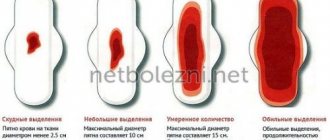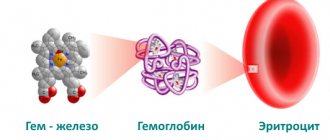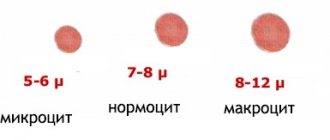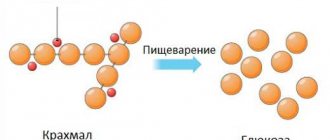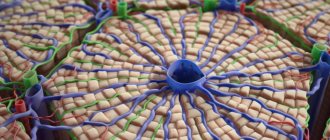What are the reasons for heavy periods?
If your periods are heavy, long and painful every time
This may be due to the presence of pathologies and changes in the body that you are not aware of.
Hormonal imbalance
The female body secretes the hormones progesterone and estrogen, which regulate the menstrual cycle. Excess estrogen can cause the lining of the uterus to thicken, which in turn causes heavier bleeding during menstruation.
Ovarian dysfunction
The condition when the ovaries do not release an egg (ovulation does not occur) during the menstrual cycle is called anovulation. This occurs because the body does not produce progesterone as during a normal cycle.
Bleeding disorder
Between 10 and 30% of women with heavy periods suffer from bleeding disorders, which can make it difficult to stop bleeding.
Uterine polyps
Polyps are small benign growths in the uterus that can increase the amount of blood released during menstruation. May also cause minor bleeding between cycles and after penetrative intercourse. Sometimes polyps can develop into malignant tumors, especially in older women, so it is recommended to remove them.
Uterine fibroids
Uterine fibroids are a benign tumor in the muscle layer of the uterus. Most often they appear in women of late reproductive age (35-45 years). This is a very common condition that affects about 80% of women during their lives. Menorrhagia is most often caused by large or numerous fibroids. Most often, fibroids are small and are not accompanied by any symptoms.
Premenopause
This period is characterized by hormonal changes before menopause, and many women notice an increase in the volume of menstruation
Recovery after childbirth
Often after childbirth, periods can be very heavy. In some women they gradually become the same as they were before childbirth, but in many they remain abundant.
Endometrial hyperplasia
Some women may develop a condition in which the endometrium of the uterus becomes too thick. This condition is called endometrial hyperplasia and can cause heavy, prolonged bleeding with blood clots. It most often occurs after menopause, but it sometimes occurs in younger women.
Adenomyosis
Adenomyosis is a condition in which the endometrium of the uterus grows into the muscular and intermediate layers of the uterus. Most often occurs in women of childbearing age (25-35 years). Inflammatory processes occur in places where the endometrium grows. This condition is often difficult to diagnose, and the causes of its development are poorly understood.
Other diseases
Heavy periods can also be associated with endometroiosis, thyroid disease, pelvic inflammatory disease, kidney disease, liver disease and cancer.
How to prevent disease
To prevent the onset of the disease, during pregnancy you need to regularly visit an obstetrician-gynecologist, follow a diet, control your weight, and do physical exercises for pregnant women.
Hormonal disorder
Hormones are responsible for the process of menstruation. In the first phase - estrogen, in the second phase - progesterone. Under the influence of estrogen, the uterus forms the endometrium. Progesterone strengthens the formed endometrial layer, and when fertilization does not occur, the hormone provokes menstruation.
With more estrogen than necessary, the uterus can form an additional layer of endometrium; a lack of progesterone will cause a delay in menstruation and scanty discharge.
If the hormonal balance is disturbed, the periods are dark, scanty or, conversely, abundant. The cycle is irregular, clots are constantly coming out. My stomach hurts, my temperature rises, I feel nauseous. Hormonal disruption can also occur during menopause.
Stress
A large load on the nervous system also causes clots to appear.
Try not to overwork, sleep enough hours, don't swear, avoid conflicts and think positively.
When tissue-like pieces come out during your period, it can signal cancer in the uterus and pelvic inflammatory disease.
Infections
You could have caught a common infection. Inflammatory processes modify the structure of the uterus and simultaneously increase blood viscosity and acidity. This is how “meat” appears in the discharge, accompanied by a brown spot at the end of menstruation.
The causes of infection are:
- failure to comply with personal hygiene rules;
- washing the genitals too often;
- using shower gel that is not suitable for you;
- frequent change of sexual partners;
- unprotected sexual intercourse.
IMPORTANT! The cause of “something strange” can even be diseases not directly related to the reproductive system: diabetes, malfunction of the pituitary gland, abnormal metabolism, and so on.
Bad habits
If you like to drink or smoke, even rarely, then be prepared for the appearance of your period with pieces of meat. Alcohol and tobacco negatively affect the immune system and slow down metabolism.
- Why pain occurs during menstruation: causes of discomfort
Give up bad habits. Otherwise, the situation will only get worse.
Obesity
Obesity also slows down your metabolism. The body works differently. Often this causes hormonal imbalance, and because of this, clots appear.
Adjust your diet. Make it as varied and useful as possible. Don't overeat, but don't starve either. Don’t force your body with diet and don’t torture your body with fast food. A bit of everything.
Abortion
After an abortion, blood clots should come out. If they last more than ten days and are accompanied by high fever and pain, consult a doctor.
Bloody discharge, along with white, yellow or gray color, signals a miscarriage. There is nothing more that can be done here.
IMPORTANT! To make sure there are no pathological processes, you need to do an ultrasound and take a blood test for coagulation after menstruation.
Once heavy periods
Miscarriage
Miscarriages can often occur before a woman even knows she is pregnant, because in the very early stages they can appear as heavy periods.
Ectopic pregnancy
An ectopic pregnancy occurs when a fertilized egg implants outside the uterus. Symptoms of an ectopic pregnancy can easily be confused with heavy menstruation. This condition can be fatal.
If you are pregnant and experience heavy bleeding, you must call an ambulance!
Non-hormonal intrauterine device
Heavy periods are a common side effect of using non-hormonal IUDs.
Medicines
Blood thinners and anti-inflammatory drugs may cause heavier menstrual bleeding.
Please remember that heavy menstruation is not always explained by some kind of pathology. Each woman's menstrual cycle is unique and heavy bleeding may simply be a feature of your body. However, large blood loss can cause excess iron loss and anemia. With mild anemia, you may experience fatigue and weakness. More severe forms can cause dizziness, headache, and rapid heartbeat. Heavy periods are often accompanied by severe uterine cramps, which cause severe pain (dysmenorrhea). Severe pain cannot be tolerated and this condition may require medication.
Heavy periods after a cleanse, abortion or miscarriage
If a woman has had an abortion or miscarriage, her body has experienced severe stress, and also a major hormonal change. According to statistics, approximately 12% of women have irregular menstrual cycles after an abortion; they may also have heavy periods after an abortion. If it was a medical abortion, then uterine bleeding very often appears. To avoid serious complications, it is better to immediately seek help from a doctor.
After curettage, a woman may have bleeding similar to menstrual bleeding. This is how it should be, there is no need to be afraid. After a few days, the discharge will change color (turn brown) and gradually dry up. But real menstruation should begin in 26-35 days (this depends on the length of the cycle), it proceeds as usual. But if heavy periods appeared after cleansing, i.e. a woman has to change pads every 2-3 hours, she needs to consult a doctor. An unpleasant feeling in the lower abdomen and elevated temperature may indicate inflammation.
What can you do at home to ease heavy periods?
- If you are in pain, take a non-steroidal anti-inflammatory drug. You can also apply a heating pad to your stomach—the heat eases cramps.
- Iron-rich foods and iron-containing supplements can help ease heavy menstruation and cope with iron deficiency in mild forms of anemia.
- Foods rich in iron include beef, liver and other offal, turkey, spinach, fish, pumpkin seeds, dried apricots, white beans, cocoa beans, and champignons. It also makes sense to increase your vitamin C intake because it helps with iron absorption. A lot of vitamin C is found in kiwi, bell peppers, strawberries, citrus fruits, broccoli, tomatoes, kohlrabi, pineapple.
- Drink enough water.
If you have heavy bleeding for several days, your blood volume may decrease significantly. Drink 4-6 extra glasses of water to maintain your blood volume.
What it is?
Menstruation is bleeding from the uterine cavity caused by the rejection of its mucous layer - the endometrium.
It becomes clear why menstrual blood may contain clots.
The amount of blood released may vary: some women experience heavy periods, others have scanty periods.
This condition requires examination, as it may be the beginning of a pathological process.
Anemia with fibroids
Constant blood loss due to fibroids can lead to anemia. The level of red blood cells and hemoglobin in the blood decreases. The woman constantly feels tired, becomes pale, and has headaches and dizziness. Sometimes the appetite becomes distorted and cravings for inedible things - for example, you may want to chew on a piece of chalk. Hair loss and brittle nails are also possible symptoms of anemia.
The brain of a woman suffering from anemia is constantly in conditions of oxygen starvation. There is “fog” in the head, the quality of life decreases. Appearance deteriorates. And all this because of fibroids.
Is it possible to cure uterine bleeding with folk remedies?
Uterine bleeding is a symptom of a huge variety of diseases and requires especially careful attention due to the likelihood of serious consequences for life and health. Any discharge of blood from the vagina that is not associated with normal menstruation should be taken as a reason for an urgent visit to a gynecologist.
Having noticed signs of uterine bleeding, many women try to treat themselves, resorting to traditional medicine, which can lead to tragic consequences. Folk remedies against uterine bleeding, such as infusions of nettle, viburnum, horsetail and shepherd's purse, do demonstrate some effectiveness, but are used only as an addition to the main therapy after consultation with the attending physician.
What symptoms may occur?
You need to visit a gynecologist if you have the following symptoms:
- You have noticed that your periods have become heavier than before. A woman may notice that she begins to spend more hygiene products and has to choose more “drops”.
- During your period, you begin to feel worse, and pain occurs. Worried about weakness, increased fatigue.
- The duration of menstruation has increased.
- There is pressure, discomfort, pain in the pelvis.
- Enlargement of the abdomen, something dense can be felt in it. If the fibroid is large enough, it protrudes and is noticeable when the woman lies on her back.
- I am worried about pain in the pelvis and legs.
- Urination has become frequent or difficulty occurs during urination.
- Constipation occurs constantly.
- Your vagina leaks blood when you don't have your period.
These signs may indicate not only fibroids; they occur in various diseases. An accurate diagnosis will be made by a gynecologist after examination and ultrasound.
First aid for uterine bleeding
It is impossible to cure the pathology on your own, as well as to identify the cause of this condition. Therefore, you need to contact a gynecologist and undergo a series of studies: tests and ultrasound.
In case of severe bleeding, when the blood flows without stopping, you need to call an ambulance. Before the doctors arrive, you need to provide first aid to the patient. It consists of the following actions, you can:
- Lay the patient on a flat surface, placing a pillow under her feet - they should be approximately 20 - 30 cm above body level;
- Apply a cold object (for example, a bottle of cold water) to the lower abdomen;
- The patient should be given sweet drinks.
If you are pregnant, you should call an ambulance in any case.
Hemostatic drugs during menstruation
If there is heavy blood loss during menstruation, the best thing to do is consult a specialist to conduct a full examination and rule out possible diseases. For heavy periods, the following medications may be prescribed:
Vikasol
This drug is a synthetic analogue of vitamin K, which takes an active part in blood clotting, namely, it affects the formation of prothrombin. Vikasol for heavy periods can only be used as prescribed by a doctor, since this drug has certain indications and contraindications. You need to understand that Vikasol is effective for heavy periods only if the cause of blood loss is a deficiency of vitamin K. Therefore, it is categorically not recommended to prescribe such a drug yourself.
Dicynone
Dicynone is also quite often used for menstruation. This is a hemostatic drug prescribed for heavy bleeding. Dicinone during menstruation is usually prescribed when the cause of bleeding is fibroids, as well as vascular diseases. Like any other drugs, dicinone has specific indications, contraindications, and side effects, so you can take dicinone during your period strictly as prescribed by your doctor.
Diferelin
This drug is a synthetic analogue of gonadotropin-releasing hormone and belongs to the group of antitumor drugs. A drug such as diferelin regulates menstruation at the level of sensitivity of peripheral receptors to GnRH. The drug is used for endometriosis and uterine fibroids. Only after examination by a doctor and confirmation of the appropriate diagnosis can diferilin be prescribed. Heavy periods should definitely be a reason to consult a specialist.
Tranexam
Tranexam is used quite often during menstruation. This hemostatic drug during menstruation can be prescribed in different situations. This is a modern hemostatic drug, the mechanism of action of which is the activation of fibrinolysin and the formation of plasmin. Tranexam during menstruation is usually prescribed in tablet form, and its use should be under the supervision of a doctor.
Askorutin
Ascorutin is a drug that contains vitamin C, or ascorbic acid, and rutin. It is used during menstruation quite often. Its action is to strengthen the walls of blood vessels, as well as reduce the fragility and permeability of capillaries. This drug also has antioxidant properties, which improves overall health.
There are many reasons for heavy periods. Many women try to solve this problem on their own by taking hemostatic drugs during menstruation. However, to achieve the desired effect, it is very important to understand the cause of blood loss. But only a specialist can correctly determine this.
